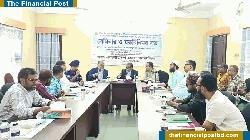Nepal's health ministry said on Wednesday that the death toll in this week's anti-corruption protests in the country rose to 25.
It also said 633 people were injured.
Nepali youth protesters yesterday set parliament ablaze as Nepali Prime Minister KP Sharma Oli obeyed furious crowds to quit.
Protesters flooded the streets of Kathmandu, some jubilant and celebrating, others setting fire to government buildings and brandishing automatic rifles.
The rapid descent into chaos shocked many, and Nepal's military warned against "activities that could lead the country into unrest and instability" in the Himalayan nation of 30 million people.
Protests began on Monday with demands that the government lift a ban on social media and tackle corruption, with police trying to crush the rallies -- including using live ammunition, according to Amnesty International.
The unrest is the worst in decades in the poor Himalayan country, which is wedged between India and China and has struggled with political and economic instability since protests led to the abolition of its monarchy in 2008. Since then, the country has seen 13 governments.
Young Nepalis have for years been frustrated at the lack of jobs, and millions have gone to work in the Middle East, South Korea and Malaysia, mainly on construction sites, and send money home.
A key trigger for the protests, say activists and experts, has been a growing perception that the families of the ruling elite live lives of relative luxury in an otherwise poor nation, exposing deep inequalities.
On Nepali social media, the term "nepo kids" -- a play on nepotism -- was viral in the weeks leading up to Monday's protests. The term is commonly used to refer to the children of top government officials and ministers.
FP/MI


 Journalists need financial protection: Press Council Chairman at Sreemangal
Journalists need financial protection: Press Council Chairman at Sreemangal
 Press Council workshop in Moulvibazar to prevent media misreporting
Press Council workshop in Moulvibazar to prevent media misreporting
 JUCSU Polls: Independent Abdur Rashid grabs VP, Shibir’s Mazhar bags GS
JUCSU Polls: Independent Abdur Rashid grabs VP, Shibir’s Mazhar bags GS
 ‘Suspected foreign agent’ sent to jail
‘Suspected foreign agent’ sent to jail
 US Tariff reduction possible if trade deficit narrows: Adviser
US Tariff reduction possible if trade deficit narrows: Adviser